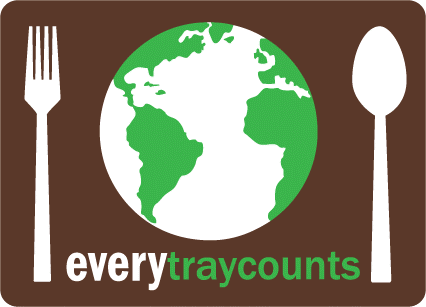Why are we still using polystyrene trays?
Polystyrene is less expensive per tray relative to other options such as compostable paper trays or other environmentally-friendly trays at the time of purchase. However, in a recent pilot project in the Chapel Hill Carrboro School District in North Carolina, the compostable paper tray cost, if used districtwide, could be offset by the savings provided by the reduction of trash. In general, eco-friendly trays are becoming more competitive as an alternative to polystyrene trays if we look at the total lifecycle cost of a tray.
What are the health concerns?
In 2011, US federal health regulators declared that styrene, a component of polystyrene, is “reasonably anticipated to be a human carcinogen.” Children eat school food directly off of these polystyrene trays, a petroleum-based product composed of the chemicals benzene and styrene. Some children enjoy scraping their trays with utensils, possibly ingesting the chemical styrene.
In addition, there is evidence that suggests polystyrene can leach out of polystyrene food containers and cups when food or drinks are hot. The level of fat content in food is also known to cause styrene to leak (i.e., high-fat soups and beverages)
To find out whether food containers are made with polystyrene, look for the number 6 inside the recycling symbol.
What are the environmental concerns?
Polystyrene is made with petroleum, a non-sustainable and heavy polluting resource. Some sources suggest that it would take polystyrene 5,000 years to biodegrade into small particles. More recent research suggests that expanded polystyrene, the material used in our lunch trays, never biodegrades. It photodegrades, breaking down into smaller and smaller pieces. Some researchers feel that this composition means that they will degrade into smaller and smaller pieces but never disappear.
Why not use trays that can be cleaned in dishwashers and reused?
Currently, many schools do not have dishwashers installed; they lack the plumbing infrastructure and/or capital budget to retrofit school buildings to accommodate dishwashers. In addition, there are energy and water issues to be concerned about. Dishwashers require a high temperature to kill bacteria and to ensure clean dishes. Washing dishes across school districts every day translates to an enormous amount of water and energy. Dishwashers are expensive to purchase and maintain. When you add the cost of labor, supplies, and maintenance, the issue becomes more complicated. Consider that here in North Carolina, we have had periodic drought situations which have required limiting the use of water!
However, in some situations there are energy-efficient dishwashers available, and other factors may apply. When deciding between compostable trays vs. reusable trays, a comparative analysis of full life cycle cost could be warranted if the infrastructure for washing and re-using exists.
If we get rid of polystyrene trays and don’t clean trays in the dishwasher, what is the alternative?
Every Tray Counts supports the use of compostable trays, with or without a composting solution. We are aware that modern landfills are designed to preserve their contents, rather than transforming them to mulch. When compostable trays, (including the food waste) are sent to landfills, they decompose anaerobically (without oxygen), creating methane gas. They do not break down the way they would in a commercial composting facility, which turns the trays and accompanying food waste to soil. So, at this time and when possible, we are advocates of partnering with a private composting facility in your area. If there isn’t one in your area, we still advocate sending the compostable trays to the local landfill. The first priority of Every Tray Counts is to get school districts to eliminate polystyrene trays from the selection of possibilities in the cafeteria lunchroom. The obligations to our children’s health and to the environment remain.
Some trays are “biodegradeable.” Is that the same as compostable?
“Biodegradable” does not mean that a product is compostable, but does mean that the product will eventually biodegrade due to the actions of naturally occurring microorganisms.
“Compostable” means that a product will undergo complete degradation by biological processes during composting into carbon dioxide, water, inorganic compounds at a rate consistent with other known compostable materials. The definition of compostable includes a specific time frame for biodegradation and that end results of the process will help the soil.
Compostable products have to meet a composting standard, such as ASTM D6400 or EN 13432, and usually display a certification logo such as the Biodegradable Products Institute (BPI), Vinçotte, or BNQ logo to name a few. (source: (http://www.sustainablebiomaterials.org/lifecycle.endoflife.php)
